Israeli Strikes On Syria's West Coast Kills Two Syrian Soldiers
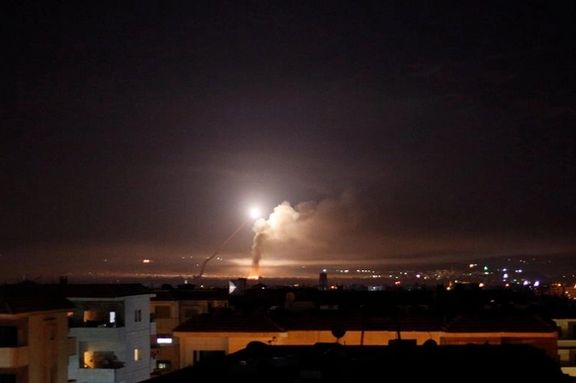
Israeli airstrikes on Wednesday killed two Syrian soldiers and injured six more, according to state media, citing a military source.

Israeli airstrikes on Wednesday killed two Syrian soldiers and injured six more, according to state media, citing a military source.
The source detailed the attack originating from the Mediterranean Sea and targeting Syrian air defense installations in Tartus on the West coast.
"At exactly 17:22 (14:22 GMT) this afternoon, the Israeli enemy carried out strikes," stated the official news agency SANA. "The aggression led to the death of two soldiers and wounded six others," it continued.
Throughout the course of more than a decade of conflict in Syria, neighboring Israel has launched numerous airstrikes within Syrian territory. The operations have predominantly focused on Iran-backed forces, Hezbollah militants, and Syrian military positions.
The Syrian Observatory for Human Rights, an organization monitoring the conflict, reported that the airstrikes on Wednesday also hit a weapons depot associated with the Iran-backed Hezbollah group. The British-based monitor, which maintains sources within Syria, confirmed the fatalities of the two soldiers. Additionally, an unidentified fighter was killed "in attacks believed to be Israeli missile fire."
Israel typically refrains from commenting on specific airstrikes carried out in Syria. However, it has consistently asserted its stance of preventing Iran, a key supporter of the Syrian government, from expanding its influence in the region.
Since the outbreak of the Syrian conflict in 2011, it has resulted in the deaths of over half a million people, originally sparked by the suppression of pro-democracy protests.

Cybersecurity experts have revealed that hackers affiliated with Iran launched a series of cyberattacks, compromising a total of 34 entities across three countries.
The attacks, between March 2021 and June 2022, were carried out by the state-sponsored hacking group known as Charming Kitten, primarily focused on Israel but also affected Brazilian and Emirati organizations.
According to a report released by cybersecurity firm ESET, the cyber operations were executed using a specific backdoor malware called Sponsor. The hacking group exploited a software vulnerability in Microsoft Exchange servers to gain access to their targets, delivering the malware to the victim's technical infrastructure.
The malware enables hackers to execute their commands on the compromised servers of the targeted companies and steal sensitive information.
Companies in various sectors, including financial services, engineering, manufacturing, technology, law, telecommunications, and more, were among the victims of the regime-backed hackers. Additionally, a healthcare company in Brazil also fell victim to the attacks.
No specific information has been provided about the Emirati organization targeted.
Researchers from ESET have emphasized that the companies were targeted due to their failure to update their software infrastructure.
The incident followed warnings issued in 2021 by several cybersecurity organizations in the United States, the United Kingdom, and Australia about the potential threat of Iranian regime hackers exploiting vulnerabilities in Microsoft Exchange servers.
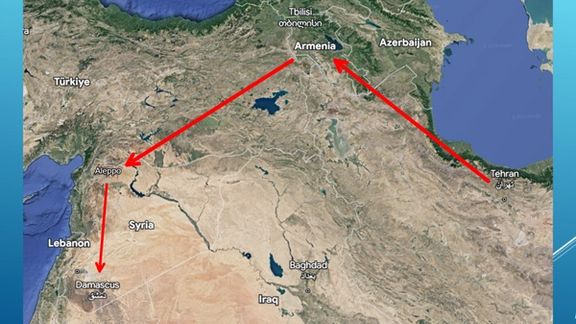
Amid simmering tensions between Yerevan and Baku, a new report has shed light on how Iran is making the best use of ties with Armenia to act against Israel.
Israel’s Alma, an institute focused on threats to Israel, released a report Wednesday elaborating on how Armenia functions as a transit point in the Islamic Republic’s air corridor route to Syria and Lebanon.
The report said Iran exploits Armenia not only to subvert Azerbaijan – an ally of Israel – but also to facilitate the Islamic Republic’s delivery of military equipment to Syria and then to Lebanon, underlining that “the Iranian effort in both arenas works against Israel.”
The Israeli institute pointed out that Iran supports Armenia in the conflict with Azerbaijan over the disputed Nagorno-Karabakh region, and that Revolutionary Guards (IRGC) operate in the area while tensions are high and may flare up again in the near future. “Iran is acting against Azerbaijan on multiple fronts, with the IRGC’s Quds Force conducting operations in asymmetric warfare, information warfare, and transferring weapons and military equipment to Armenia.”
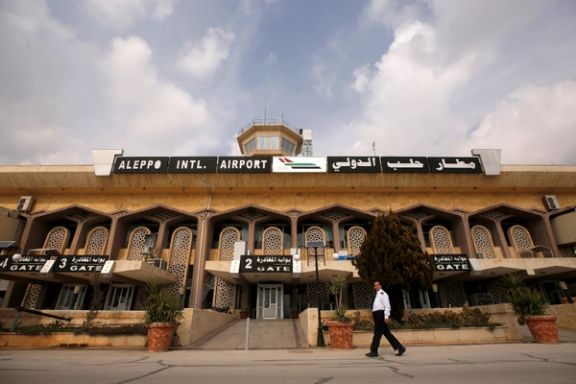
Referring to the late-August Israeli air attack on Aleppo International Airport – the third one this year, Alma said that Aleppo area, home to about 60,000 Armenians, is “a geographical anchor within the Iranian corridor to Syria, and the Aleppo airport serves as one of the entry gates of the aerial route as part of the weapons corridor from Iran to Syria and Lebanon.”
However, the report failed to note that after more than a decade of civil war, most Armenians who are Christians have fled from the city the city.
The report also mentioned Mehdi Sobhani, Iran’s former envoy to Syria who left his position in March to become the regime’s ambassador to Armenia. “The Iranian ambassador to Syria and Lebanon is normally a senior IRGC officer in charge of coordinating Iranian activity with Hezbollah and the regime of Syrian President Bashar Assad, rather than a diplomat appointed by the Iranian Foreign Ministry,” Alma said, claiming that the selection of Sobhani as the Iranian envoy to Yerevan reflects “the Revolutionary Guards’ high regard for Armenia.”
Alma referred to an earlier report released in December 2022 about the role of Iranian airline Mahan Air -- including its passenger aircraft -- in arms transfers from Iran to Syria and Lebanon on behalf of the IRGC’s Quds Force. It explained that after Iranians airlines were exposed as carriers of arms and forces for the IRGC, Armenian airline Flight Travel LLC was created in 2018 “as a front for Mahan Air’s Armenian headquarters.”
The US Treasury Department sanctioned Flight Travel LLC for aiding Mahan Air in transporting Shiite militia operatives from Pakistan and Afghanistan to Syria, the report underlined, claiming that “These aircraft most certainly carried not only militia operatives but also military equipment and weapons.”
“Ma’raj (Meraj), Qeshm Fares, Pouya Air, and Iran Air are all Iranian airlines that operate within the Iranian corridor and are linked to the IRGC’s activities using cargo and passenger planes," the report said, adding that they are all sanctioned by the US.
According to Alma’s investigation, three Armenian airlines and one Iranian are still operating between Iran and Armenia. “The deployment of Armenian planes could thwart intelligence surveillance of Iranian activity by making it more difficult to cover their tracks,” it said. Iran Air Tour – a subsidiary of Iran Air -- and Syrian airline Cham Wings play an important role in supporting the Iranian effort for the transfer of materiel and militias to Syria.
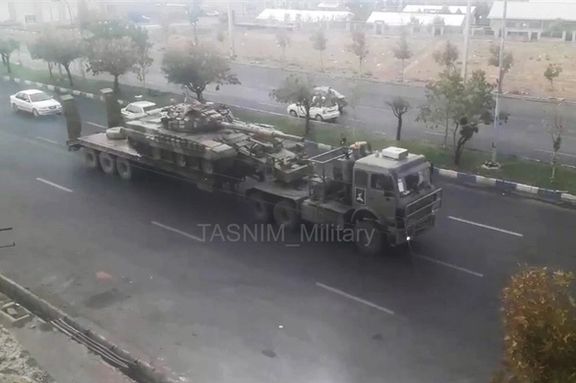
The ground forces of the Islamic Revolutionary Guard Corps (IRGC) have deployed forces to the northwestern borders of Iran where tensions have been rising between Iran and Kurdish separatist groups.
Iran recently gave an ultimatum to Iraq to disarm “separatist terrorist groups” operating in the Kurdistan region and according to reports from the Tasnim News Agency, the IRGC's ground forces aim to “bolster security measures along the northwestern borders of the Islamic Republic” as the deadline for the ultimate approaches.
The timing of the deployment coincides with the anniversary of Kurdish-Iranian Mahsa Amini's death, which also threatens to bring the masses to the streets this week, causing the regime to step up security nationwide, not only on its fragile borders.
While the Islamic Republic categorizes Iranian Kurdish armed groups as "terrorist groups," the groups maintain that their armed campaigns are driven by the pursuit of Kurdish rights and autonomy after years of oppression.
In recent times, the Iranian regime has intensified its crackdown on Kurdish-majority towns and cities in the western provinces of the country. The majority of Iran's estimated 10 million Kurds reside in the western regions of the nation.
Furthermore, the Islamic Republic has repeatedly conducted military operations against Iranian Kurds seeking refuge in Iraqi Kurdistan, further exacerbating regional tensions.
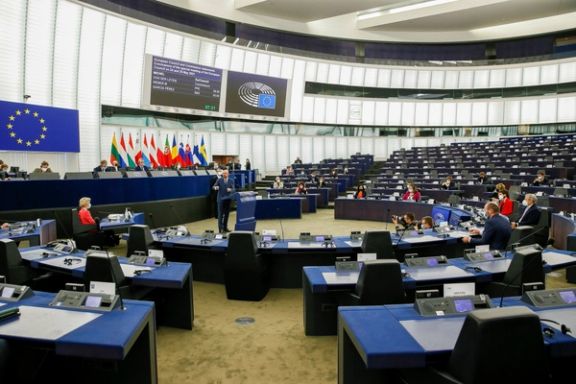
Members of the European Parliament Tuesday grilled EU’s foreign policy chief Josep Borrell over the bloc’s Iran policy as he tried to defend the trite strategies.
The plenary session opened in Strasbourg to discuss the effectiveness of European measures “one year after the murder of Mahsa Amini” in custody of the Islamic Republic’s hijab police that ignited the Women, Life, Freedom protests, the boldest revolt against the regime since its establishment in 1979.
Opening remarks by European Parliament President Roberta Metsola a day earlier sounded vapid as she reiterated that “Parliament proudly stands with the brave, defiant women and men who continue to fight for equality, dignity and freedom in Iran...” She also “strongly” condemned the Iranian regime for “taking EU and dual nationals hostage” and called for “the immediate release of EU official Johan Floderus and Professor Ahmad Reza Jalali.”
EU foreign policy chief Joseph Borrell opened similarly, claiming that "the EU has stood united over the past 12 months on Iran.” “The last 12 months marked a clear change in our relations with Iran. We've adopted nine consecutive rounds of sanctions...Our relations with Iran are at a low point, but we need to keep diplomatic channels open."
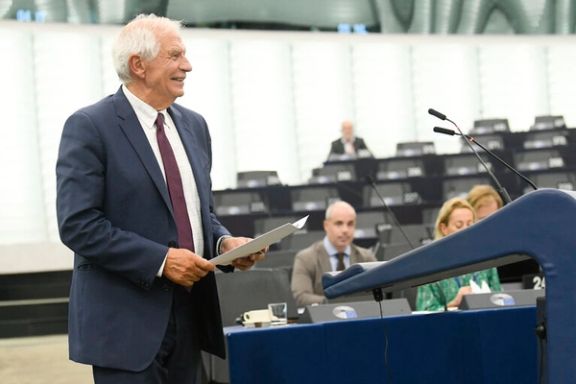
After Borrell, dozens of MEPs took turns decrying what they dubbed as toothless measures against the regime that failed to prevent killing of protesters, taking hostages, supplying arms to Russia and wreaking havoc across the region through the Revolutionary Guards as well as its proxy militias. Their demands included labeling the IRGC as a terrorist outfit, more comprehensive sanctions against the regime's human rights abusers, and refusing any negotiations with the regime until all EU citizens unjustly held are freed.
German MEP Hannah Neumann said, "Mr. Borrell, it's time to clearly spell it out: The EU's Iran policy of the last 44 years has failed. Stop meeting regime representatives! Start meeting the many different people that advocate for a free Iran! Stop financial flows of the regime and start exploring avenues for the diaspora to send home remittances for strike funds!”
“Spell out the truth: This regime terrorizes its own citizens and the whole region, it systematically uses rape to force political prisoners into confessions, and it is already preparing to crack down on the protests planned for September 16 (the death anniversary of Mahsa Amini). Mr. Borrell, you have to stop stabilizing a brutal regime while the people in Iran are prepared to die for its downfall!" she added.
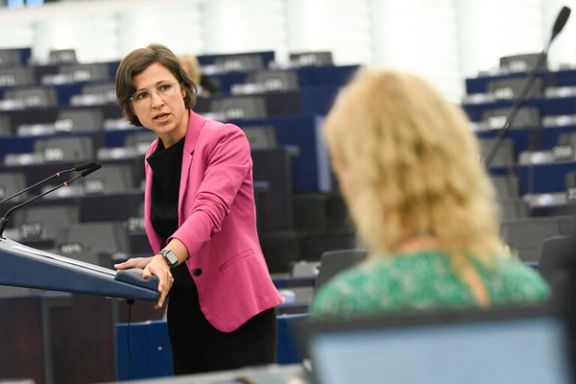
Guy Verhofstadt, a former Belgian prime minister, denounced EU’s approach and strategy on the Islamic Republic, saying, “Let's be honest: the policy and the strategy of Europe towards Iran is purely symbolic. It has nothing to do with stopping the regime.”
“This parliament wants another approach! I request that in two months, we revisit this matter on the plenary of this parliament so that we can see the change in your strategy and that you can also convince your colleagues, the ministers of foreign affairs, because a new course of action is not solely your responsibility,” he added.
“What is happening in Iran is a disgrace. It's a regime of violence and murder,"Verhofstadt underlined.
Charlie Weimers, a Swedish conservative democrat, noted that “EU leaders have expressed support for the protests against the mullahs. But the EU has continued its failed policy of appeasement.”
He called on all the decision makers to “unite -- from left to right -- for a new EU policy: Maximum support for the people. Maximum pressure on the regime.”
Bart Groothuis, a Dutch MEP, called on the bloc to “expel all Iranian ambassadors from Europe” and cut diplomatic ties “until all European hostages are freed."
Borrell, the High Representative for Foreign Affairs and Security Policy, took the floor again after the MEPs, saying, “I don't think it is acceptable to say that the European Union supports this regime, which is what I just heard... You've expressed your moral indignation, and that's okay, but I don't think that that is actually going to solve miraculously the problems.”
"We've been working to help support Iranian women in their fight for their fundamental rights and will continue to do so. We are also working with the member states to try and solve many of the cases of European citizens that have been illegally detained in Iran. And we're trying to help and provide support for them to come back to Europe,” he stated.
Regarding calls for the designation of IRGC as a terrorist group, Borrell reiterated his earlier position that a national authority or court should find the IRGC complicit in terrorism before the EU takes a step to designate it.
Borrell claimed that "At the moment, we don't have that, and well, I can't take this step. We need the unanimity of the 27 member states and that is the basis. So, I'm afraid I can't do this. If you think that I'm wrong, tell me why."
His remarks came despite numerous efforts by MEPs and activists to provide the necessary groundwork for the EU to act on calls to list the IRGC as a terror group. In July, two MEPs stated that according to the “Common Position 2001/931/CFSP, Article 1(4) which sets out the parameters for the inclusion of persons and entities on the EU terrorist list,” the IRGC can be listed without any legal barriers. In June, a similar line of arguments was put forth by Iran’s exiled prince Reza Pahlavi, citing a group of French-Iranian lawyers who reasoned that there are no legal obstacles for the EU to blacklist the Revolutionary Guards.
In January, the European Parliament overwhelmingly passed a resolution calling on the EU and member states to designate the IRGC as a terrorist group, as it does not have such an authority. If the resolution garners enough support, it is then upon the national governments of the EU member states to make the final decision. The listing of the IRGC must have a unanimous vote by all 27 EU members in the EU Council.
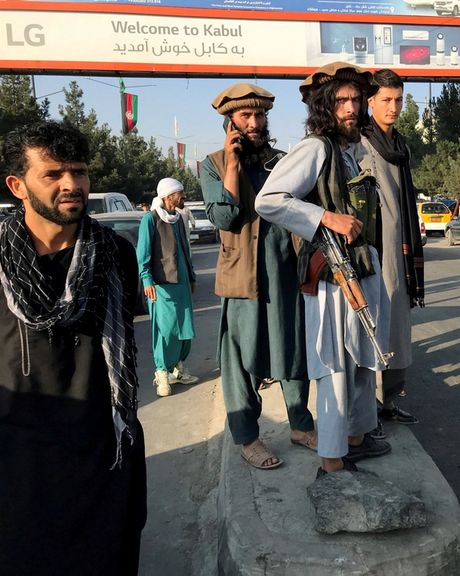
An Iranian daily has sounded the alarm regarding the potential danger posed by the Taliban along Iran's borders reflecting concerns in Tehran.
Jomhouri-e Eslami newspaper wrote of the critical need to address the issue, highlighting the risks posed to both the eastern regions of Iran and the broader geopolitical landscape, while Tehran usually downplays the issue in a bid to retain calm.
The editorial speaks of the plight of the people of the eastern part of the country and the prolonged water shortages they endure at the hands of the Taliban which continues to refuse to deliver Iran's water share from the Helmand River.
The newspaper claims that “safeguarding Iran's rights and ensuring border security while preventing the spread of negative consequences from the Taliban's authority in Afghanistan can be achieved through political means” in a call to arms to the nation.
Referencing the ruling Taliban leadership's two-year reign, the newspaper highlighted Afghanistan's 12% increase in the industrial production of narcotics and the surge in the production of methamphetamine. "This trend highlights the Taliban's reliance on the narcotics trade as a source of revenue, effectively engaging in drug terrorism," the newspaper wrote.
The editorial shows the regime's growing concern about its Afghan neighbors, which in May saw two Iranians killed and one Taliban soldier dead in a border dispute over water rights. In August, an aerial photo circulating on social media led to extensive criticism of the government for “conceding” thousands of hectares of Iranian land to the Taliban. The photo shows a 130 km long security wall built by Iran at some distance from the border demarcation line with Afghanistan which is along the Hirmand (Helmand) River.






